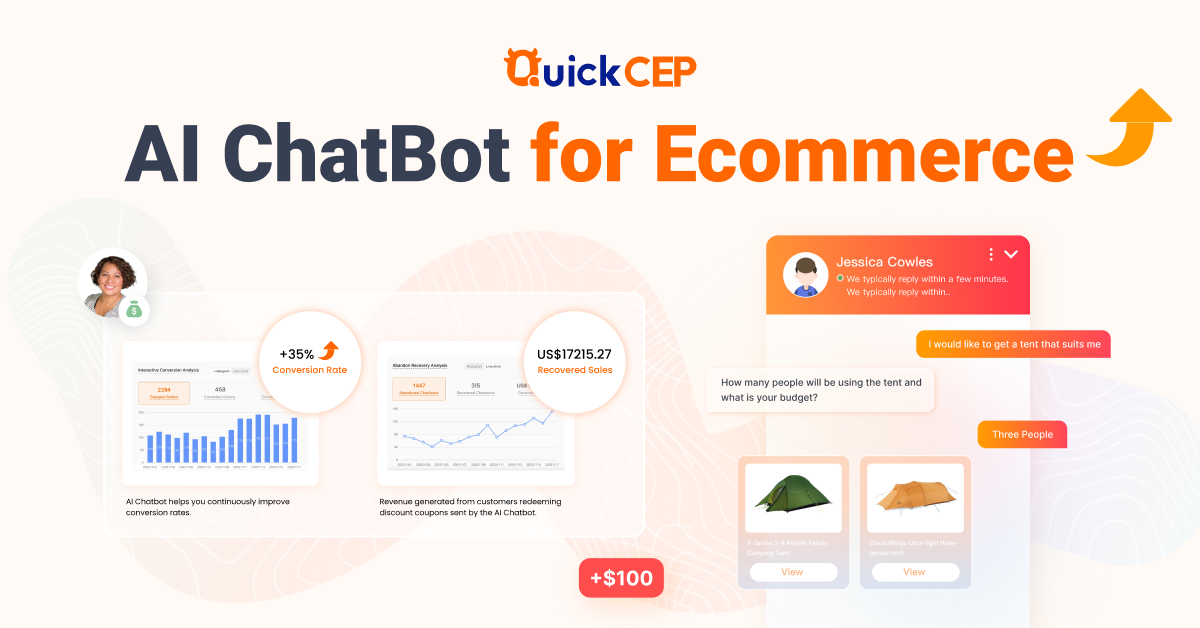AI Chatbots: The Future of Revenue Growth and Conversion Rates

Introduction to AI Chatbots in eCommerce
In the fast-paced world of eCommerce, businesses are constantly seeking innovative ways to enhance customer interactions and streamline operations. One such groundbreaking technology that has gained significant traction is AI Chatbots. These intelligent virtual assistants are revolutionizing the way online businesses engage with their customers.
Understanding AI Chatbots
AI Chatbots are computer programs designed to simulate conversation with human users, typically over the internet. Their basic functions include answering customer queries, providing product recommendations, and assisting with the purchase process. The rise of AI Chatbots in eCommerce can be attributed to advancements in artificial intelligence and machine learning technologies, enabling these chatbots to understand and respond to user inquiries more effectively than ever before.
The Importance of AI Chatbots in Modern eCommerce
The integration of AI Chatbots holds immense significance for modern eCommerce platforms. Firstly, they play a pivotal role in enhancing customer experience by offering personalized assistance round the clock. Moreover, these chatbots contribute to streamlining operations by automating repetitive tasks such as order tracking, inventory checks, and handling frequently asked questions.
Utilizing this cutting-edge technology not only sets businesses apart from their competitors but also fosters a more efficient and satisfying shopping experience for consumers.
How AI Chatbots Rescue Revenue for eCommerce Businesses
In the realm of eCommerce, identifying and addressing lost revenue opportunities is crucial for sustained growth. AI Chatbots play a pivotal role in recognizing and mitigating these challenges, ultimately contributing to the rescue of revenue streams.

Identifying Lost Revenue Opportunities
Cart Abandonment Issues
One common challenge faced by eCommerce businesses is cart abandonment, where customers add items to their shopping carts but leave the website without completing the purchase. This phenomenon leads to a significant loss in potential revenue. AI Chatbots can intervene at this critical juncture by engaging with customers who are on the verge of abandoning their carts. By providing personalized assistance, addressing concerns, and offering incentives such as discounts or free shipping, chatbots can effectively rescue these abandoned sales opportunities.
Missed Upsell and Cross-sell Opportunities
Another area where revenue can slip through the cracks is in upselling and cross-selling. Often, customers may not be aware of complementary products or upgrades that could enhance their initial purchase. AI Chatbots are adept at analyzing customer behavior and purchase history to make relevant product recommendations. By proactively suggesting additional items or upgrades during the buying process, chatbots can significantly increase the average order value and capture missed revenue opportunities.
Strategies AI Chatbots Use to Rescue Revenue
Personalized Recommendations
AI Chatbots leverage advanced algorithms to analyze customer data and preferences, enabling them to offer highly personalized product recommendations. By understanding individual shopping habits and past purchases, chatbots can suggest items that align with each customer's unique preferences. This tailored approach not only enhances the overall shopping experience but also increases the likelihood of converting browsing into actual sales.
24/7 Customer Support
The availability of round-the-clock customer support is a key factor in rescuing potential revenue for eCommerce businesses. AI Chatbots provide continuous assistance to customers irrespective of time zones or business hours. This ensures that queries are addressed promptly, issues are resolved efficiently, and purchasing decisions are facilitated without unnecessary delays. By offering seamless support at any hour of the day, chatbots contribute significantly to capturing revenue that might otherwise have been lost due to unattended customer inquiries.
In essence, AI Chatbots serve as proactive allies in identifying and rescuing revenue opportunities for eCommerce businesses through personalized engagement strategies and uninterrupted customer support.
AI Chatbots and Their Role in Improving Conversion Rates
Understanding Conversion Rates in eCommerce
In the realm of eCommerce, conversion rates hold a pivotal role in determining the success of online businesses. Conversion rates refer to the percentage of website visitors who take the desired action, such as making a purchase or signing up for a newsletter. Understanding the factors that influence these rates and the significance of optimizing them is crucial for sustained growth and profitability.

What Affects Conversion Rates?
Several factors can impact conversion rates in eCommerce. The design and user experience of the website, the effectiveness of product descriptions, pricing strategies, and the ease of navigation all play significant roles. Additionally, customer trust, brand reputation, and the availability of responsive customer support contribute to shaping conversion rates.
The Importance of Optimizing Conversion Rates
Optimizing conversion rates is imperative for maximizing revenue and ensuring a healthy return on investment. By enhancing the overall user experience, businesses can increase their chances of turning browsing customers into satisfied buyers. Moreover, improved conversion rates lead to a higher return on advertising spend and marketing efforts, ultimately contributing to sustainable revenue growth.
How AI Chatbots Improve Conversion Rates
Engaging Customers in Real-Time
One key way that AI Chatbots contribute to improving conversion rates is by engaging customers in real-time conversations. When potential buyers have queries or require assistance during their online shopping journey, chatbots provide immediate responses, guiding them through their decision-making process. This real-time engagement creates a seamless shopping experience, reducing hesitation and increasing the likelihood of conversion.
Providing Instant Answers to Queries
Another significant aspect where AI Chatbots excel is in providing instant answers to customer queries. Whether it's about product specifications, shipping details, or return policies, chatbots offer quick and accurate information without any delays. This instant access to relevant information empowers customers to make informed purchasing decisions swiftly, thereby positively impacting conversion rates.
In essence, by engaging customers in real-time conversations and providing instant answers to queries, AI Chatbots play a vital role in enhancing conversion rates for eCommerce businesses.
The Future of AI Chatbots in eCommerce
Emerging Trends in AI Chatbot Technology
As technology continues to evolve, the future of AI Chatbots in eCommerce holds exciting prospects. Several emerging trends are shaping the trajectory of AI chatbot technology, propelling it towards greater efficiency and effectiveness.
Advances in Natural Language Processing
One of the most significant advancements driving the evolution of AI Chatbots is the refinement of natural language processing (NLP) capabilities. NLP enables chatbots to comprehend and respond to human language with remarkable accuracy and contextual understanding. As NLP algorithms become more sophisticated, chatbots can engage in more nuanced conversations, understand complex queries, and provide tailored solutions to customer inquiries. This advancement not only enhances the overall user experience but also fosters deeper customer engagement, ultimately contributing to improved conversion rates.
Integration with Other eCommerce Technologies
The integration of AI Chatbots with other eCommerce technologies is another pivotal trend that is reshaping the landscape of online retail. By seamlessly integrating with customer relationship management (CRM) systems, inventory management platforms, and payment gateways, chatbots can access a wealth of real-time data and insights. This integration empowers chatbots to offer personalized recommendations based on inventory availability, process transactions securely within the conversation interface, and provide proactive order status updates. Furthermore, by leveraging data from CRM systems, chatbots can deliver highly personalized interactions that cater to individual customer preferences and purchase history.
Predictions for AI Chatbots in eCommerce
Looking ahead, several predictions underscore the transformative potential of AI Chatbots in revolutionizing the dynamics of eCommerce.
Personalization at Scale
One prominent prediction revolves around achieving personalization at an unprecedented scale through AI chatbot technology. As chatbots continue to gather and analyze vast amounts of customer data, they will be able to deliver hyper-personalized experiences tailored to each individual's preferences, browsing behavior, and purchase history. This level of personalization extends beyond product recommendations to encompass customized marketing messages, targeted promotions, and adaptive pricing strategies. By catering to customers on a one-to-one basis, businesses can forge stronger connections with their audience and drive higher conversion rates.
Enhanced Customer Insights
Another compelling prediction centers on the generation of enhanced customer insights through AI chatbot interactions. As chatbots engage in conversations with customers across various touchpoints, they gather valuable data regarding consumer preferences, pain points, frequently asked questions, and buying patterns. By harnessing this wealth of conversational data using advanced analytics tools, businesses can gain profound insights into customer sentiment and behavior. These insights inform strategic decision-making processes related to product development, marketing campaigns, inventory management, and overall business operations.
Final Thoughts
As the landscape of eCommerce continues to evolve, the impact of AI Chatbots on online businesses cannot be overstated. Their integration has ushered in a new era of customer engagement and operational efficiency, yielding a multitude of benefits for eCommerce platforms.
The Impact of AI Chatbots on eCommerce
A Recap of Key Benefits
The introduction of AI Chatbots has brought forth a myriad of benefits for eCommerce businesses. Firstly, these intelligent virtual assistants have significantly enhanced the overall customer experience by providing personalized assistance and seamless support round the clock. Moreover, they have played a pivotal role in rescuing potential revenue through targeted engagement strategies and proactive intervention during critical junctures such as cart abandonment. Additionally, their ability to engage customers in real-time conversations and provide instant answers to queries has led to tangible improvements in conversion rates, ultimately contributing to sustained revenue growth.
Real-World Success Stories
Numerous real-world success stories underscore the transformative impact of AI Chatbots on eCommerce businesses. From reducing cart abandonment rates to increasing average order values, these chatbots have consistently proven their efficacy in driving revenue growth and fostering customer satisfaction. Businesses across various industries have reported substantial improvements in customer retention, operational efficiency, and sales performance following the implementation of AI chatbot technology.
Preparing for the AI Chatbot Revolution
Steps for eCommerce Businesses
In preparation for the impending AI chatbot revolution, eCommerce businesses must take proactive measures to leverage this innovative technology effectively. Firstly, they should conduct comprehensive assessments of their customer engagement touchpoints and identify areas where AI chatbots can add value. Subsequently, businesses should invest in robust AI-powered solutions that align with their specific operational needs and customer service requirements. Furthermore, training personnel to collaborate seamlessly with AI chatbots and integrating them into existing workflows is essential for maximizing their potential impact.
The Importance of Continuous Learning and Adaptation
Continuous learning and adaptation are imperative for staying ahead in an ever-evolving digital landscape. As AI chatbot technology advances, businesses must remain agile and receptive to incorporating new features and capabilities into their existing infrastructure. Moreover, gathering insights from customer interactions with chatbots and leveraging this data to refine marketing strategies, product offerings, and overall user experience is crucial for sustained growth.
See Also
Transforming Online Shopping: AI Chatbots Boosting Sales
Enhance Shopify Sales with AI-Powered Chat Assistants
Advancing Customer Service: The Rise of Chatbot Technology


